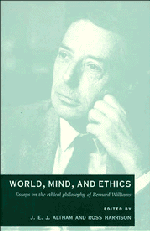Book contents
- Frontmatter
- Contents
- Notes on editors and contributors
- Introduction
- 1 The idea of equality revisited
- 2 Is the idea of purely internal consistency of choice bizarre?
- 3 Science, ethics, and objectivity
- 4 Fallibilism and objectivity: science and ethics
- 5 Might there be external reasons?
- 6 Aristotle on human nature and the foundations of ethics
- 7 A most peculiar institution
- 8 Reflection and confidence
- 9 The shape of a life
- 10 Replies
- Index
1 - The idea of equality revisited
Published online by Cambridge University Press: 05 August 2012
- Frontmatter
- Contents
- Notes on editors and contributors
- Introduction
- 1 The idea of equality revisited
- 2 Is the idea of purely internal consistency of choice bizarre?
- 3 Science, ethics, and objectivity
- 4 Fallibilism and objectivity: science and ethics
- 5 Might there be external reasons?
- 6 Aristotle on human nature and the foundations of ethics
- 7 A most peculiar institution
- 8 Reflection and confidence
- 9 The shape of a life
- 10 Replies
- Index
Summary
Bernard Williams published “The idea of equality” in 1962. In the almost thirty years that have passed, the study of distributive justice has expanded vastly. The work of John Rawls and Amartya Sen, among that of many others, has enabled us to progress further in stating the problems and canvassing plausible solutions. Williams himself has returned to issues of political philosophy on a number of occasions. Yet I believe the early article retains its claims on our attention, partly because it makes some interesting and insufficiently criticized mistakes, partly because it contains some valuable and insufficiently explored suggestions. In this chapter I try to remedy both deficiencies.
I shall not summarize Williams' argument in “The idea of equality,” but only state some of his main distinctions and conclusions. He gives considerable attention to the notion of equality of persons, i.e. their claim to what Ronald Dworkin has called “equal concern and respect.” And he is concerned with showing that this ideal has some bite, in that it suggests specific distributive conclusions. He also considers situations in which there is a prima-facie argument for unequal distribution, on the basis of need and merit. Need is taken as constituting unambiguous and unproblematic grounds for access to scarce goods; I shall argue that it is both ambiguous and problematic. Merit, in Williams' exposition, is doubly questionable as a criterion for the allocation of scarce goods, such as access to high-quality education.
- Type
- Chapter
- Information
- World, Mind, and EthicsEssays on the Ethical Philosophy of Bernard Williams, pp. 4 - 18Publisher: Cambridge University PressPrint publication year: 1995
- 4
- Cited by



